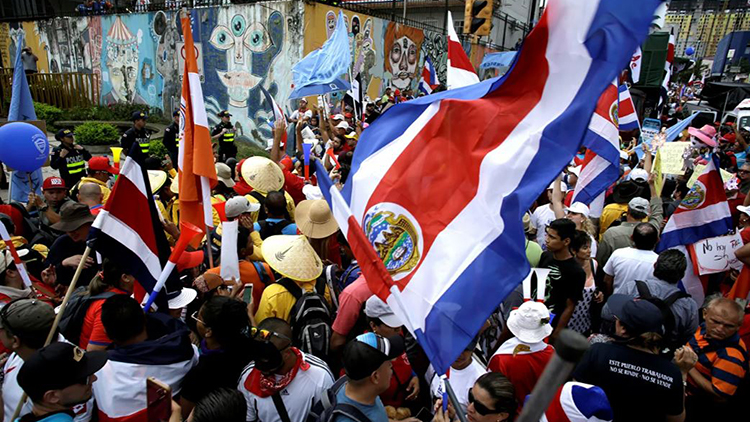The Worker Confederation Rerum Novarum (CTRN), the Central of the Costa Rican Workers Movement (CMTC), Central Workers of Costa Rica (CGT), the Unitary Confederation of Workers
En savoir plus sur unita (CUT) and the Union of Costa Rican Education Workers (SEC) met with Carmen Moreno, director of the ILO Office for Central America, Haiti, Panama and Dominican Republic and the United Nations Resident Coordinator in Costa Rica, Allegra Baiocchi.
The discussion was centred on three key issues related to the country’s priorities:
- The urgent need to formulate policies for decent work and employment creation through respect for the ILO’s Decent Work Agenda and the United Nations’ role in this area.
- The importance of strengthening social dialogue in Costa Rica and reinforcing the role of the United Nations system as a tool for supporting and promoting social dialogue and social consensus.
- The need to strengthen the institutional framework for human rights in the country, especially fundamental rights and trade union rights.
After elaborating on these three key issues, the trade unions made a number of requests, including the call for the United Nations system to play an active role in redirecting and reactivating the work of the Consultative Committee of the High Level Council for the Sustainable Development Goals (SDGs) in the country, in accordance with the decree establishing the committee, which defines it as a space for consultation and dialogue. Costa Rica’s trade union centres are part of this committee and see it as central to achieving an inclusive, democratic and participatory process to prepare the next Voluntary National Review (VNR) on the implementation of the SDGs in the country. To illustrate the implications of the government’s neglect of this committee during 2019 and 2020, the trade unions referred to the shortfalls of the VNR 2020. The review, submitted by the government to the United Nations in July 2020, was hurriedly prepared at the last minute, with no input from trade unions and significant gaps in the areas of Decent Work and SDG 8, in the absence of any analysis or forecasts regarding the relevant formal targets and indicators for the review. Despite the severe decline in decent work and economic growth indicators, they are given very little attention in the report.
Ms Baiocchi agreed that Mr Oscar Valverde of ILO-ACTRAV in Costa Rica and Victoria Cruz of the UN Resident Coordinator’s Office, both of whom also attended the meeting, would be delegated to coordinate the work plan with the trade unions. The ILO and ACTRAV have played an essential role in supporting the active participation of the trade union centres in these processes.
At the close of the meeting, the trade union movement expressed great satisfaction with the willingness and openness shown towards building the relationship between the trade unions and the resident coordinator and continuing to work actively on the 2030 Agenda and its Sustainable Development Goals.
The Consultative Committee has been back in operation since September 2020 and four meetings have been held to date, addressing certain aspects of the three issues raised by the trade union centres, although the country will not be submitting a VNR this year. Two working meetings have already been held with ILO-ACTRAV and the UN Resident Coordinator’s Office (RCO), and several proposals are being prepared for the action plan, which should be finalised in April.
For more information
Contact Contactar Fanny Sequeira, SEC
info[@]seccr.com


